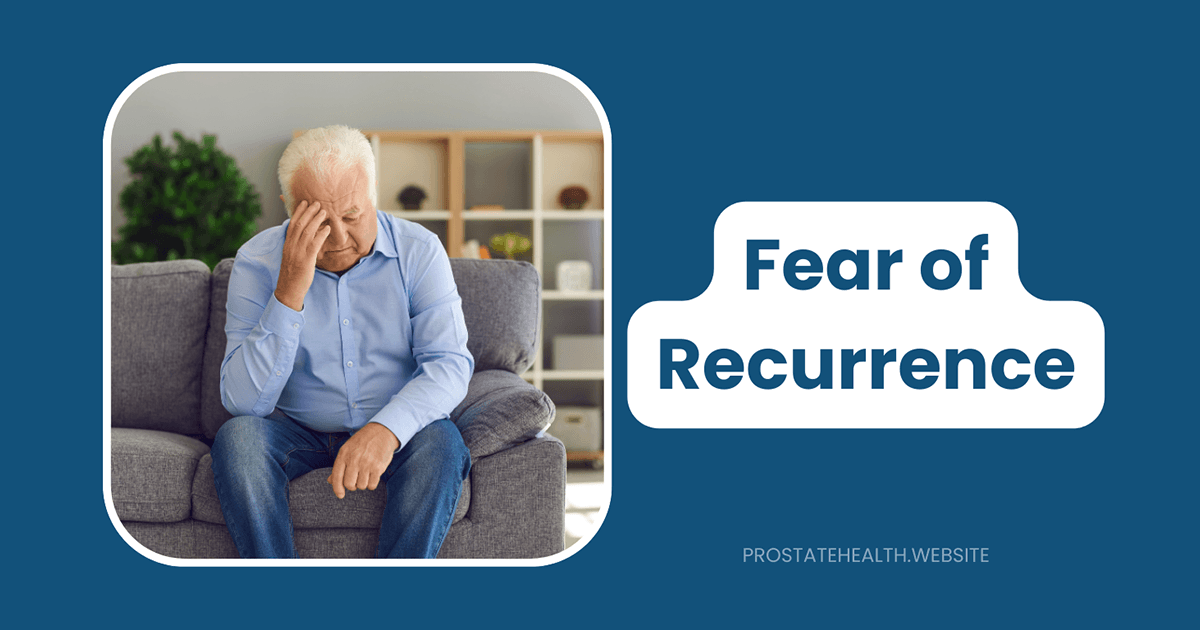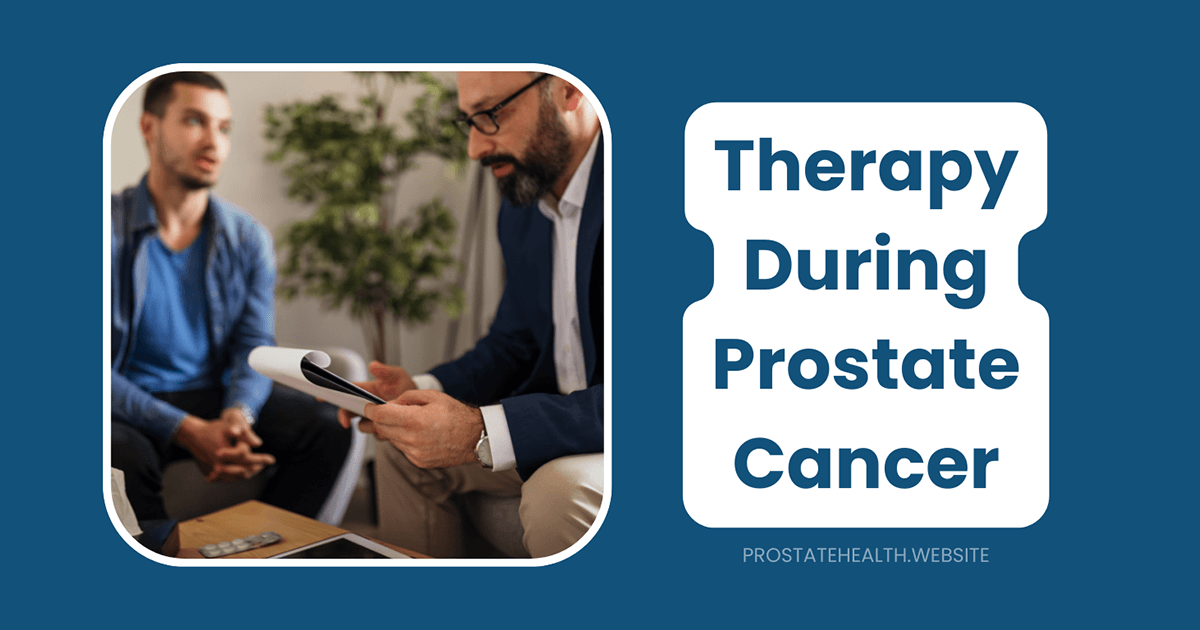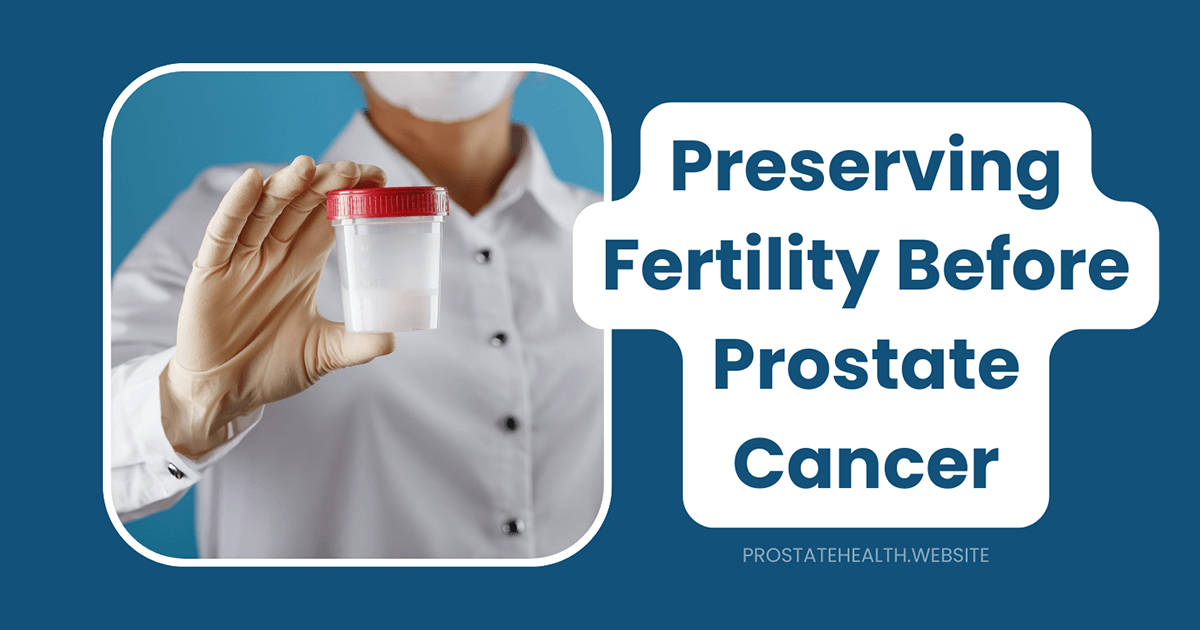Managing Fear of Recurrence After Prostate Cancer Treatment

When James completed his prostate cancer treatment, he expected to feel nothing but relief and gratitude. The surgery was successful, his PSA levels had dropped to undetectable, and his doctor was optimistic about his prognosis. Yet in the quiet moments—lying awake at 3 AM, waiting for test results, or feeling an unexplained twinge of pain—a persistent fear would surface.
“What if it comes back?”
If you’ve had these thoughts after prostate cancer treatment, you’re not alone. Studies show that up to 40% of prostate cancer survivors experience significant fear of cancer recurrence (FCR). Despite the excellent survival rates for prostate cancer—nearly 100% for localized disease at five years—the emotional aftermath of diagnosis and treatment can linger long after physical recovery.
As a prostate cancer survivor myself and an advocate who has worked with hundreds of men navigating this journey, I’ve seen how FCR can cast a shadow over survivorship, affecting quality of life, relationships, and mental health. But I’ve also witnessed the transformative power of addressing these fears head-on with evidence-based strategies and support.
This article explores why fear of recurrence happens, how it affects us, and most importantly, practical approaches to managing these fears so they don’t control your life after prostate cancer.
Understanding Fear of Recurrence
Before we discuss solutions, it’s important to understand what fear of recurrence is and why it happens.
What Is Fear of Cancer Recurrence?
Fear of cancer recurrence (FCR) is defined as the fear, worry, or concern that cancer will return or progress in the same place or elsewhere in the body. This fear exists on a spectrum—from occasional, manageable thoughts to persistent, intrusive worry that significantly impacts daily life.
Research published in the Asia-Pacific Journal of Oncology Nursing identified three distinct profiles among prostate cancer survivors:
- Adapted group (25.7%): Minimal fear that doesn’t significantly impact daily life
- Struggling group (42.2%): Moderate fear that causes periodic distress
- Dysregulated group (32.1%): Severe fear that substantially affects quality of life
Why Does It Happen?
Several factors contribute to FCR in prostate cancer survivors:
Medical Factors
- PSA monitoring: The regular blood tests that track Prostate-Specific Antigen levels can trigger anxiety, especially around testing time (often called “PSA anxiety”)
- Initial cancer characteristics: Higher-grade tumors, higher PSA at diagnosis, and more advanced stage can increase concerns about recurrence
- Treatment type: Different treatments carry different recurrence risks, which can influence fear levels
Psychological Factors
- Loss of the “safety net”: The transition from active treatment with frequent medical contact to less intensive follow-up can feel like losing a safety net
- Uncertainty: Cancer introduces profound uncertainty into life, challenging our sense of control
- Trauma response: For many men, cancer diagnosis and treatment are traumatic experiences that can trigger ongoing hypervigilance
Social and Demographic Factors
- Age: Younger survivors often report higher FCR
- Social support: Limited support systems can exacerbate fears
- Information exposure: Excessive research or hearing about others’ cancer experiences can increase anxiety
As Thomas, a 62-year-old in our support group, described it: “Before cancer, I rarely thought about my mortality. Now, every ache or pain sends my mind racing to worst-case scenarios. It’s like cancer gave me a new lens that I can’t take off.”
The Impact of Fear
When left unaddressed, fear of recurrence can significantly impact quality of life:
Psychological Effects
- Anxiety and depression: Persistent FCR is associated with higher rates of clinical anxiety and depression
- Sleep disturbances: Racing thoughts often intensify at night, disrupting sleep
- Concentration problems: Intrusive worries can make it difficult to focus on work or daily activities
Physical Effects
- Increased symptom reporting: Men with high FCR tend to report more physical symptoms and concerns
- Hypervigilance about bodily sensations: Normal aches and pains may be interpreted as signs of recurrence
- Stress-related physical symptoms: Chronic stress can manifest as headaches, digestive issues, and muscle tension
Behavioral Effects
- Excessive medical seeking: Some men cope by seeking frequent reassurance through additional tests or appointments
- Avoidance: Others may avoid follow-up care altogether due to fear of bad news
- Lifestyle impacts: FCR can lead to either excessive health behaviors or abandonment of healthy habits
Relationship Effects
- Communication challenges: Many men hide their fears to protect loved ones, creating emotional distance
- Difficulty planning for the future: Fear can make long-term planning feel impossible or pointless
- Intimacy issues: Anxiety can interfere with sexual and emotional intimacy
“I found myself checking my body constantly, googling symptoms at 2 AM, and thinking about cancer dozens of times a day,” shares Robert, 58. “It was exhausting, and my wife could feel me pulling away, even though I thought I was hiding it well.”
Evidence-Based Strategies for Managing Fear
The good news is that research has identified several effective approaches for managing fear of recurrence. Here are strategies with strong evidence supporting their effectiveness:
Cognitive Behavioral Therapy (CBT)
CBT is one of the most researched interventions for FCR. It works by helping you identify and change unhelpful thought patterns and behaviors.
Key components include:
- Thought challenging: Learning to recognize and question catastrophic thinking (e.g., “This headache means my cancer has spread to my brain”)
- Behavioral experiments: Testing fears against reality to build evidence that challenges anxious predictions
- Worry management: Developing skills to manage worry productively rather than letting it spiral
- Problem-solving: Enhancing skills to address actual (rather than hypothetical) problems
A systematic review of psychological interventions found that CBT-based approaches show significant effectiveness in reducing FCR, with benefits lasting well beyond the end of treatment.
Mindfulness-Based Interventions
Mindfulness practices focus on developing present-moment awareness without judgment. For prostate cancer survivors, these approaches help create distance from fearful thoughts rather than becoming entangled in them.
Effective mindfulness practices include:
- Meditation: Formal sitting practice that builds awareness of thoughts and emotions
- Body scan: Systematic attention to bodily sensations without judgment
- Mindful movement: Gentle yoga or walking with present-moment awareness
- Informal practice: Bringing mindful awareness to everyday activities
“Learning mindfulness changed my relationship with my fears,” explains James, 65. “I still have thoughts about recurrence, but I can observe them coming and going rather than getting caught in a spiral of panic. They’re just thoughts, not reality.”
Acceptance and Commitment Therapy (ACT)
ACT is a “third-wave” cognitive behavioral approach that focuses less on changing thoughts and more on changing your relationship with them. It emphasizes accepting difficult experiences while committing to actions aligned with your values.
Key elements include:
- Acceptance: Willingly experiencing thoughts and feelings without unnecessary struggle
- Cognitive defusion: Learning to see thoughts as mental events rather than literal truths
- Values clarification: Identifying what matters most to you in life
- Committed action: Taking steps toward valued living, even in the presence of difficult thoughts and feelings
Research published in Cancer Today found that ACT and other third-wave therapies showed significantly better immediate effectiveness for FCR compared to traditional CBT.
Social Support and Communication
Connection with others who understand your experience can be powerfully therapeutic:
- Support groups: Sharing experiences with other prostate cancer survivors normalizes fears and provides practical coping strategies
- Partner communication: Open discussions with partners about fears can strengthen relationships and reduce isolation
- Selective disclosure: Thoughtfully choosing when and with whom to discuss cancer concerns
“I kept my fears bottled up for months, thinking I needed to be strong,” shares Thomas. “When I finally opened up in a support group, I was amazed to hear other men—successful, confident men—express the exact same fears. That alone made me feel less broken.”
Practical Techniques You Can Start Today
While professional support can be invaluable for managing significant FCR, there are many evidence-based techniques you can implement on your own:
1. Develop a “Worry Window”
Rather than trying to suppress thoughts about recurrence (which often backfires), set aside a specific time to address these concerns:
- Schedule 15-20 minutes daily as your “worry window”
- During this time, write down all your cancer-related worries
- For each worry, identify one small action step if applicable
- When worries arise outside this window, gently remind yourself that you’ll address them during your designated time
This technique helps contain worry rather than letting it spread throughout your day.
2. Practice Body Awareness and Grounding
When physical sensations trigger fear:
- Take three slow, deep breaths
- Systematically notice what you can see, hear, touch, smell, and taste in your immediate environment
- Describe the sensation objectively (location, intensity, quality) without jumping to interpretation
- Remind yourself that bodies naturally produce many sensations unrelated to cancer
3. Create a Coping Toolkit
Develop personalized strategies for high-anxiety moments:
- Coping cards: Write down reassuring facts and statements to review when fears intensify
- Grounding objects: Keep meaningful items that help you feel centered
- Comfort playlist: Curate music that soothes or uplifts you
- Movement practices: Identify physical activities that help discharge anxiety
- Support contacts: Keep a list of people you can reach out to when fears escalate
4. Implement the “Rule of Threes”
When you notice a concerning symptom:
- Wait three days to see if it resolves (unless it’s severe)
- Consider three alternative explanations besides cancer
- Take three proactive self-care steps while waiting
This approach balances vigilance with perspective.
5. Practice Mindful Awareness Daily
Even five minutes of daily mindfulness practice can build the skill of observing thoughts without becoming entangled in them:
- Use guided meditations specifically designed for cancer survivors
- Try apps like Calm, Headspace, or the cancer-specific Untire app
- Focus on the sensation of breathing to anchor yourself in the present moment
- Notice when your mind wanders to fears and gently return to your breath
“I was skeptical about meditation—it seemed too passive for me,” admits Robert. “But starting with just five minutes each morning has gradually changed how I relate to my thoughts. The fears still come, but they don’t hijack my entire day anymore.”
When to Seek Professional Support
While some degree of concern about recurrence is normal, certain signs suggest professional support might be beneficial:
Consider Professional Help If:
- Fear interferes significantly with daily functioning or quality of life
- You avoid medical appointments due to anxiety
- Sleep is consistently disrupted by cancer worries
- You’re experiencing symptoms of depression (persistent sadness, loss of interest, hopelessness)
- Relationships are suffering due to your fears
- You find yourself constantly checking for symptoms or seeking reassurance
- Alcohol or other substances are being used to manage anxiety
Types of Professional Support:
- Psycho-oncology specialists: Mental health professionals who specialize in cancer-related psychological issues
- Cognitive-behavioral therapists: Clinicians trained in evidence-based approaches for anxiety management
- Cancer center support services: Many treatment centers offer psychological support specifically for survivors
- Structured FCR programs: Some centers now offer specialized programs targeting fear of recurrence
“I waited too long to get help,” shares Michael, 59. “I thought I should be able to handle it myself, that seeking therapy somehow meant I was ungrateful for surviving cancer. Now I realize that addressing my fears was actually an act of gratitude—it allowed me to fully live the life I’d fought so hard to preserve.”
Special Considerations for Prostate Cancer Survivors
While fear of recurrence affects many cancer survivors, prostate cancer presents some unique challenges:
PSA Monitoring and Anxiety
The regular PSA blood tests that track potential recurrence can be double-edged swords—providing reassurance but also triggering anxiety:
- PSA anxiety often peaks in the days before testing and while awaiting results
- Even small fluctuations in PSA can cause significant worry, though many fluctuations are benign
- The long-term nature of PSA monitoring means that triggers for FCR continue for years or decades
Strategies for managing PSA anxiety include:
- Schedule tests early in the day and week when possible
- Plan engaging activities for the waiting period
- Discuss with your doctor what PSA changes would be clinically significant versus normal variation
- Consider bringing a support person to appointments when results will be discussed
Biochemical Recurrence vs. Clinical Recurrence
Understanding the difference between types of recurrence can help manage fears:
- Biochemical recurrence (rising PSA without detectable cancer) may occur years before any clinical symptoms
- Many men with biochemical recurrence never develop symptomatic disease
- Multiple treatment options exist even if biochemical recurrence occurs
“Learning about the difference between a rising PSA and actual clinical recurrence helped me put my fears in perspective,” explains James. “Even if my PSA starts to rise someday, that doesn’t automatically mean a dire outcome.”
Long-Term Survival and Chronic Fear
With excellent survival rates, many prostate cancer survivors live for decades after treatment, making sustainable fear management crucial:
- Focus on developing skills that can be maintained long-term rather than quick fixes
- Recognize that fear often evolves over time, requiring different approaches at different stages
- Consider how to integrate cancer experience into your life story without letting it dominate
Partners and Family: Supporting Each Other
Fear of recurrence doesn’t just affect the cancer survivor—it impacts loved ones as well. Research shows that partners often experience levels of distress similar to or even greater than patients themselves.
For Partners and Family Members:
- Acknowledge your own fears: Your concerns are valid and deserve attention
- Practice self-care: Maintain your own physical and emotional well-being
- Communicate openly: Share your feelings while remaining sensitive to each other’s needs
- Avoid reassurance traps: Excessive reassurance can unintentionally reinforce anxiety
- Seek support: Consider joining a caregivers’ support group
For Survivors Supporting Concerned Loved Ones:
- Recognize their sacrifice: Acknowledge the emotional toll your cancer has taken on them
- Include them appropriately: Share information at a level they’re comfortable with
- Encourage their independence: Support their engagement in activities unrelated to your health
- Consider joint counseling: Professional support can help navigate these complex dynamics
“My wife and I were both struggling with fears about my cancer returning, but we were hiding it from each other,” shares Thomas. “When we finally opened up, it was like a weight lifted. Now we can support each other instead of suffering alone.”
Finding Meaning Beyond Fear
Perhaps the most powerful approach to managing fear of recurrence is not just coping with fear, but building a life so meaningful that fear becomes less central to your experience.
Strategies for Meaning-Making:
1. Post-Traumatic Growth
Many cancer survivors report positive life changes following their diagnosis, including:
- Deeper appreciation for life
- Stronger personal relationships
- Enhanced sense of personal strength
- New possibilities or paths
- Spiritual development
“Cancer changed my priorities completely,” reflects Robert. “Before my diagnosis, I was focused on career advancement and material success. Now I measure my life by the quality of my relationships and the difference I make for others.”
2. Value-Guided Living
Clarifying and committing to your core values can provide direction even amidst uncertainty:
- Identify what matters most to you (e.g., connection, contribution, learning)
- Set goals aligned with these values
- Take small, consistent actions toward these goals, even when fears arise
3. Giving Back
Many survivors find that supporting others reduces their own fears:
- Mentoring newly diagnosed men
- Participating in advocacy efforts
- Contributing to research as a patient representative
- Sharing your story to reduce stigma around men’s health
“Volunteering with newly diagnosed men gives purpose to my experience,” shares Michael. “When I’m focused on helping someone else navigate their cancer journey, my own fears naturally recede into the background.”
4. Legacy Projects
Creating something meaningful that extends beyond yourself can provide perspective:
- Recording family stories or wisdom for future generations
- Contributing to causes you care about
- Creating art, writing, or other creative expressions
- Teaching or mentoring in your area of expertise
Resources for Additional Support
These resources can provide additional support for managing fear of recurrence:
Organizations
- ZERO – The End of Prostate Cancer: Offers support groups and resources specifically for prostate cancer survivors
- Cancer Support Community: Provides free emotional support, education, and hope for cancer patients and their loved ones
- American Cancer Society: Offers information and support services for cancer survivors
Books
- “Fear of Cancer Recurrence: Cognitive-Behavioral Therapy for Fear of Cancer Recurrence” by van de Wal et al.
- “Managing Prostate Cancer: A Guide for Living Better” by Andrew J. Roth
- “Man to Man: Surviving Prostate Cancer” by Michael Korda
Apps and Online Programs
- iConquerFear: An online self-management program specifically for fear of cancer recurrence
- Untire: An app designed to help cancer patients and survivors manage fatigue and anxiety
- Meditation apps like Headspace, Calm, or Insight Timer offer specific programs for health anxiety and cancer-related concerns
A Personal Note: Living Well Despite Uncertainty
When I was diagnosed with prostate cancer at 47, I thought surviving treatment would be the hardest part. I was unprepared for the psychological aftermath—the way cancer would continue to echo through my thoughts long after my body had healed.
In the early days of survivorship, fear of recurrence dominated my mental landscape. Every twinge of pain, every PSA test, every cancer story in the news would trigger a cascade of worry that could last for days.
What I’ve learned through my own journey and through supporting hundreds of men in similar situations is this: we may not be able to eliminate fear entirely, but we can change our relationship with it. Fear of recurrence doesn’t have to control your life after prostate cancer.
The strategies I’ve shared in this article aren’t about positive thinking or denying legitimate concerns. They’re about developing skills to acknowledge fears without being controlled by them, so you can fully engage with the life you fought so hard to preserve.
As one wise member of our support group put it: “Cancer took enough from me during treatment. I refuse to let fear of recurrence take what remains.”
You’ve already shown tremendous courage in facing prostate cancer. That same courage will serve you well as you navigate life after treatment—uncertainty, fear, and all.
Have you experienced fear of cancer recurrence after prostate cancer treatment? What strategies have helped you manage these concerns? Share your experiences in the comments below to help other men navigating similar challenges.






